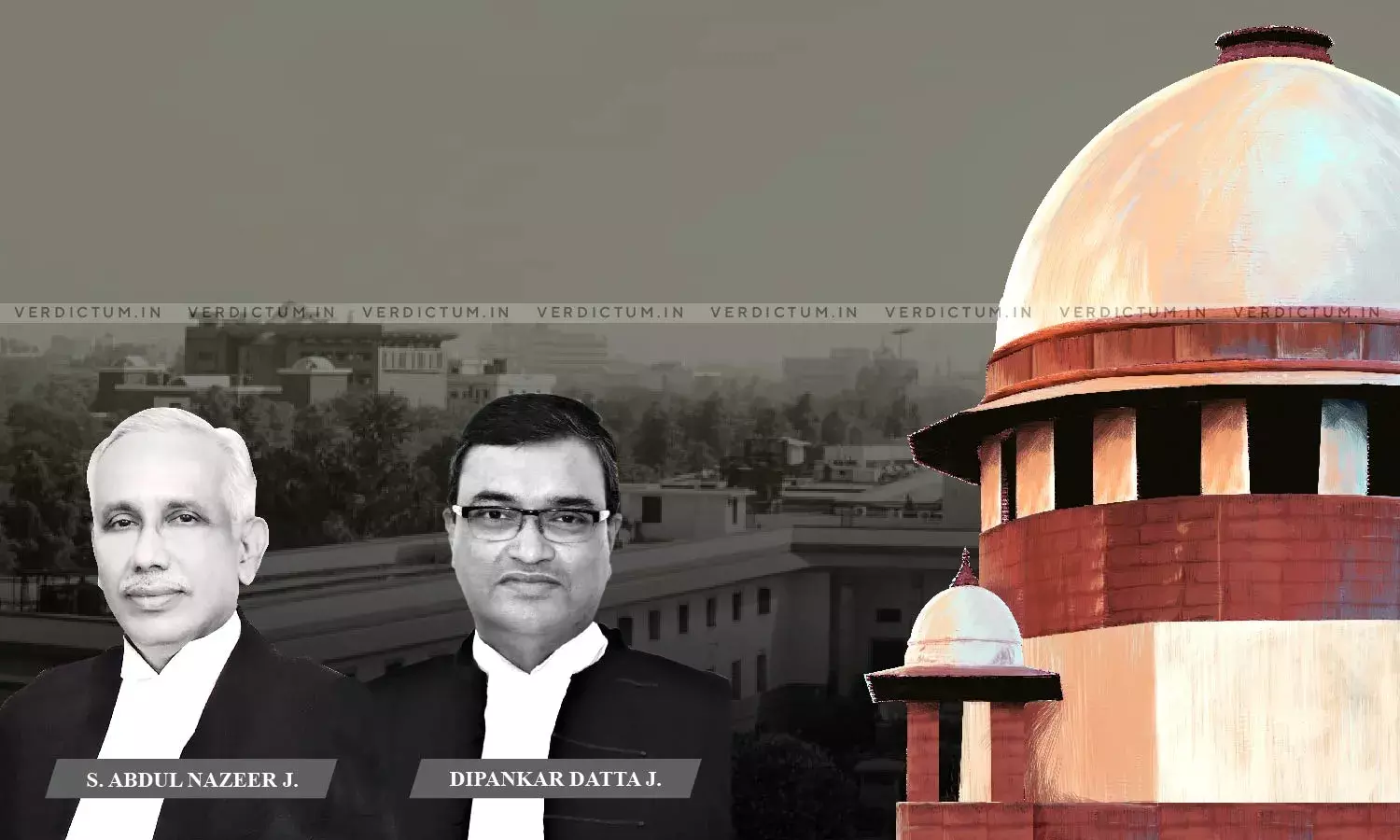SC Grants ₹2.25 Crore Compensation To Cold Storage Co. For Ammonia Gas Leakage In Chambers Resulting In Closure Of Facility

The Supreme Court in an insurance related case has granted a compensation of Rs. 2,25,00,000/- to S.S. Cold Storage India Pvt. Ltd. as there was a leakage of ammonia gas in two Chambers of the Facility which resulted in its closure in the year 1997.
The Court was dealing with an appeal under Section 23 of the Consumer Protection Act, 1986 that challenged the judgment passed by the National Consumer Disputes Redressal Commission (NCDRC) whereby the petition of the appellant was dismissed.
The two-Judge Bench comprising Justice A.S. Bopanna and Justice Dipankar Datta held, “Since we have noticed, for the foregoing reasons, that the impugned judgment and order of the NCDRC, on merits, is indefensible and that there has indeed been a deficiency of service at the end of the Respondent, we are of the considered view that ends of justice would be sufficiently served by granting to the Appellant a lumpsum amount of Rs. 2,25,00,000/- towards full and final settlement of the insurance claim. It is ordered accordingly.”
The Bench directed that the aforesaid amount shall be released by the insurance company to the cold storage company within two months and in case of its failure, the said amount shall carry interest at 10% p.a. till the amount is paid.
Senior Advocate Vijay Hansaria appeared on behalf of the appellant/S.S. Cold Storage India while Advocate Yogesh Malhotra appeared on behalf of the respondent/National Insurance Company Limited.
Factual Background -
The appellant was engaged in the business of operating a cold storage facility and the plant, machinery, and stock were continually insured by the respondent. The appellant had obtained Machinery Insurance Policy, Refrigeration Plant (Stock) Policy (for potatoes), Fire Policy (Comprehensive Fire Policy for the building, furniture plant, machinery, and installation), and Fire Policy (On stock of potatoes in the Facility). In 1997, there was a leakage of ammonia gas in Chamber Nos. 1 and 2 of the Facility, resulting in significantly elevated temperatures, and a foul smell, culminating in a closure of the Facility.
The appellant immediately after such an incident, informed the respondent and the District Horticulture Officer about the same requesting an inspection of the Facility. The Surveyor appointed by the respondent informed the appellant that the said incident had occurred due to decay, wear, and tear, leading to the leakage and that the pipe had given way along the seam as a result of which the same was excluded as per the Refrigeration Policy. The appellant instituted a complaint before the NCDRC claiming Rs. 1,03,15,680/- but the same opined that the appellant failed to establish deficiency by the respondent in providing services and declined to grant compensation, as a consequence whereof it dismissed its complaint.
The Supreme Court in view of the facts and circumstances of the case observed, “… if the reports of the Experts did not qualify to be considered only because they had a belated look at the pipes, on the same analogy the observations made by the NCDRC on visual impression thereof a few days before delivery of judgment is liable to be discredited and invalidated on the self-same ground of delay. We thus find the approach of the NCDRC to be flawed.”
The Bench said that as Judges, they are not experts in the field of refrigeration of cold storages to opine on their own which of the versions was correct and acceptable and hence, the same also applies to the members of the NCDRC.
“The NCDRC rightly observed that the reports “cannot be treated as totally independent as it was the complainant who made a choice of his experts”; nevertheless, there are certain general observations in such reports to be noticed hereafter which do help us in our search for the truth”, noted the Court.
The Court added that the observation of the NCDRC that the pipes used in the Chambers were not seamless and had welding joints was apparently made to discard the reports of the Loss Assessor and the Experts.
“It seems to us that the NCDRC made observations in the impugned judgment as if its members were experts in the relevant field and clothed with authority to sit in appeal over the same. … Considering all these factors and the attending circumstances and by applying the standard of proof of preponderance of probabilities, we feel inclined to lean in favour of the inference that the version of the Appellant, was more probable, i.e., that the leak of ammonia gas was not occasioned due to wear and tear (as claimed by the Respondent) but was the outcome of an accident10 which was not foreseen and beyond its control and not covered by any of the exceptions in the Refrigeration Policy (Exception Clause 3) so as to entitle the Respondent to claim immunity for the ultimate purpose of repudiating the insurance claim lodged by the Appellant”, held the Court.
The Court further observed that the NCDRC committed serious error by not giving the reports placed on record by the appellant the extent of credence the same deserved and that the way the NCDRC dealt with such reports was not proper and legal.
“In any event, the fact that the Appellant has not paid compensation to the potato growers as yet is hardly a factor for determining whether the Respondent was justified in repudiating the insurance claim on the basis of the Surveyor’s Report for damage caused to the stock of potatoes, which was duly insured, because of the accident”, also said the Court.
Accordingly, the Apex Court allowed the appeal to an extent.
Cause Title- S.S. Cold Storage India Pvt. Ltd. v. National Insurance Company Limited (Neutral Citation: 2023 INSC 689)


